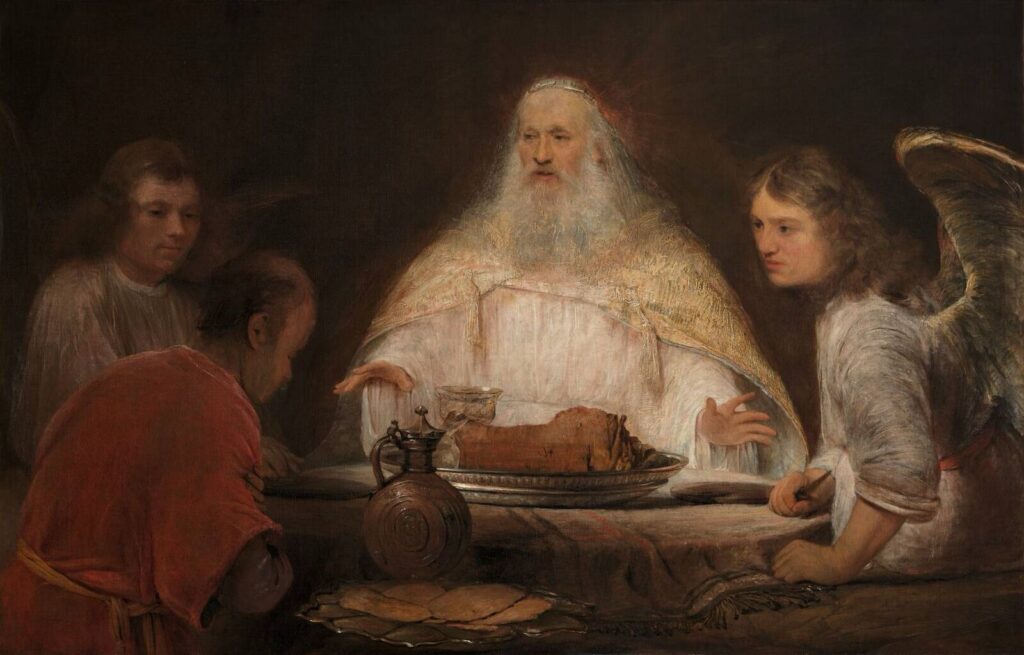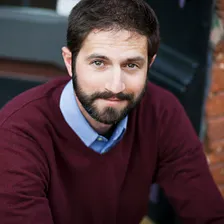Now more than ever, American Jews and Christians must see themselves as co-laborers in a shared civilizational project.
Eight months on, it’s readily apparent that October 7 was a historical watershed—not just for Israel, the Middle East, and foreign policy, but for the United States domestically. The torrent of antisemitism unleashed on that day has been nowhere more evident than on American college campuses. The more “elite” the institution, the more vile—and violent—the expression of Jew-hatred by mobs of students, faculty, and paid outsiders.
Some have likened October 7 to a signal flare, shedding light on where people stand. Chants of “death to America” and “death to Israel” may be straight out of Tehran, yet to hear them on the college quad and in the streets of Dearborn is more than surprising—it is revealing.
But as metaphors go, what Hamas did on October 7 was less like lighting a flare and more like flipping on a magnet—polarizing world opinion and activating its evil element. That element remains, thank God, a minority within American society. But it is increasingly visible, vocal, and violent. And the post-October 7 spike in antisemitic incidents has not subsided. Every week brings new disturbing revelations.
What we are witnessing in America, and in the West more broadly, is no temporary spate of hate crimes, no disconnected string of isolated incidents. It is deeper and more existential. It is a civilizational crisis. As Eric Cohen, CEO of Tikvah, put it in a recent lecture, it is a battle “for the American soul, with Jews and Israel at the center of the story.” Cohen continues:
The Jewish experience in recent days is simply the most vivid demonstration of why the existing citadels of elite American culture are broken beyond repair. They indulge mob rule over ordered liberty, revolution over civic piety, appeasement over principle, and utopian fantasies about social justice over the weighty work of preserving civilization.
“We need a new strategy,” argues Cohen. He calls it “The Exodus Project.”
The Exodus Project
Tikvah is an American charitable foundation dedicated to fostering a deep appreciation for the intellectual, religious, and political traditions of the Jewish people and the ways that Jewish ideas and values have shaped the course of history.
Those ideas and values—mediated through the Bible, accelerated by the rise of the Christian West, and strained through the filter of the Reformation and the Enlightenment—found good soil in America. They are at the root of some of our country’s most fundamental convictions, like human dignity and ordered liberty, the necessity of freedom of conscience, and the insistence that the common good is best secured when men and women are free to pursue lives of virtue.
These civilization-shaping ideas do not depend upon the Constitution; they predate it. The Declaration calls them rights—though they are equally responsibilities—that are “endowed by [our] Creator.” They are more than a frame of government or a social contract. They form a civilizational covenant, transcending the ebb and flow of history and the politics of a particular moment.
At times these values have been called “Judeo-Christian.” The better descriptor is “Hebraic,” a term that simultaneously captures their worldview significance and their biblical source.
In his lecture, Cohen insists that the “Hebraic spirit” of America and of the West is now at stake. But his Exodus Project is not a call to withdraw, lay down arms, and abandon the American experiment. The Exodus Project is no “Benedict Option.” Rather, Cohen calls for a renewal of the American covenant, a recommitment to the nation’s ideals, and a revitalizing of its life and culture.
Christians need to pay attention.
While Cohen’s lecture is directed primarily to American Jews, it is no less a clarion call to Christians to co-labor with our elder brothers in the faith and shoulder together what Cohen calls “the weighty responsibility of preserving American liberty.”
What then is to be done?
Jews and Christians Together
The focus of the Exodus Project is American education, specifically higher ed, but it has profound implications for multi-faith partnerships and even for geography. Here’s Cohen (paragraph breaks mine):
American Jews will need a paradigm shift in our political, moral, and civilizational imagination.
We will need to build deeper friendships and alliances with patriotic Americans—especially Christian Americans—who love Israel, share our Hebraic values, and seek our guidance in renewing the moral center of American culture.
We will need to relocate in large numbers to new and more welcoming parts of the country—including the Southeast, the Southwest, and other more conservative regions of the country that protect religious freedom and promote religious education.
Many American Christians—evangelicals and Catholics especially—will resonate with Cohen’s words. We, too, have been laboring in these fields for a while. Consider what we have been stewarding: The classical education, school choice, and homeschooling movements. Christian worldview training and campus discipleship ministries. Higher-ed institutions, new and old, committed to the liberal arts, the classical tradition, and historic, orthodox Christian faith. Prominent leaders and thinkers across the faith spectrum who defend Christian convictions, American values, and Western civilization. Policy organizations and law firms committed to the protection of life, the family, parental rights, educational choice, free speech, and religious liberty.
There is, in other words, a thick institutional ecosystem of Christian people and organizations that are up to—indeed, have long been working at—the kind of project that Cohen articulates.
But more than a call to work, Cohen’s words are a call to partnership. They are a crucial invitation at a pivotal moment in history. Are Christians listening? Will they respond?
Cohen’s Exodus Project lecture comes thirty years, to the month, after Chuck Colson and Father Richard John Neuhaus brought Evangelicals and Catholics Together to articulate their shared Christian convictions and recommit to certain moral truths about the dignity of human beings, the sanctity of life, the centrality of marriage and family, and the need for individual and civic virtue.
Of course, there is much in that document that many Jews are unable to affirm. But there is also much they can agree with, such as this: “In public education, we contend together for schools that transmit to coming generations our cultural heritage, which is inseparable from the formative influence of religion, especially Judaism and Christianity.”
The time is right to discover and articulate many more such points of convergence between the American Jewish and Christian communities. While the distinctly Christian commitments of Evangelicals and Catholics Together must endure, that document provides a model for another, broader—but no less convictional—ecumenical project. Call it Jews and Christians Together.
But the project is bigger than a document. As more American Jews heed Cohen’s call to relocate to faith-friendly parts of the country, they will establish new communities and institutions, and they’ll join existing ones. Christians must be ready to welcome them, not just as friends and neighbors but as allies in a shared civilizational mission.
Our institutions, ministries, schools, and universities should be open to Jewish partners and Jewish voices. Each community, Jewish and Christian, can do this without sacrificing its theological distinctives. Tikvah is already engaged in such bridge-building work. A number of other institutions are doing this well, too—Philos Project, Becket Fund, Colorado Christian University, and the Religious Freedom Institute, to name just a few. These can serve as models. Christian organizations will be better for it, able to draw upon the rich well of Jewish thought, faith, and tradition—the same that gave rise to our own faith and still nurture it.
Now more than ever, Jews and Christians in the United States must see themselves as co-laborers: in biblical faith, in the spirit of the Hebraic tradition, in the articulation of enduring moral truths, in resistance to godless and dehumanizing ideologies, and in the renewal, building up, and sustaining of American civilization, life, and culture.
The closing words of Cohen’s lecture are fitting here, too:
If … we still believe that America matters for the fate of mankind—and that the fate of America itself now hangs in the balance—then we should commit ourselves to the project of American renewal. We should focus not simply on our safety in America but our responsibility for America. Are we up for the challenge? Shall the new exodus begin?
Ian Speir is a Senior Legal Fellow with the Religious Freedom Institute and the founder of Covenant Law, which represents Jewish, Christian, and other religious organizations across the country.






Comment by M McL on June 13, 2024 at 11:20 pm
House GOP Conference Chair Elise Stefanik delivered remarks at the Israeli Knesset Sunday, saying victory for Israel in the war against Hamas starts with “wiping” those responsible for the October 7 terrorist attacks “off the face of the Earth”.
vs
Ret. Adm. James Stavridis, “You can’t kill your way to victory in a setting like this.”
Comment by ASW on June 17, 2024 at 8:56 am
thank you for this powerful and hopeful outline for how to move forward in these times. Much to think about for those currently in the wilderness of the northeast
Comment by John Reuter, Esq. (Ret.) on June 17, 2024 at 11:23 pm
No! It is long past time for New Testament Christains to sever the Zionist Christian abberation from Protestantism and recognize that theirs is the Old Testament, and ours the New Testament. There can be no reconciliation between the two any more than the Christian can reconcile with the Muslim . Ours is the Triune God. Neither the Jew nor the Muslim can be reconciled with the Christian God. It is long past time to cast the Zionist abberation into the darkness where false doctrines disappear into history books. It is also necessary to more forward and cast off the shackles of theological Judaism to defend Protestantism from Islam. But more importantly, to excise liberalism which is destroying it from within.
Comment by Salvatore Anthony Luiso on June 18, 2024 at 1:02 am
Regarding “But his Exodus Project is not a call to withdraw, lay down arms, and abandon the American experiment. The Exodus Project is no ‘Benedict Option.'”:
Is that a fair characterization of the Benedict Option? From what I’ve heard and read about it, I don’t think so.
Comment by John E on June 19, 2024 at 10:14 am
John Reuter’s comment is remarkably off-base. The Apostles, and Jesus Christ himself, honored what we call the Old Testament as, well, the Bible. John Reuter’s Marcionite diatribe is what belongs in the darkness, not 3/4 of the Bible.